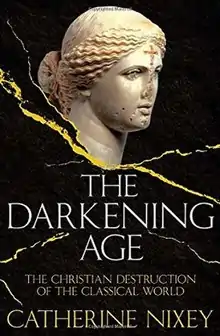The Darkening Age
The Darkening Age: The Christian Destruction of the Classical World is a 2017 book by Catherine Nixey. In the book, Nixey argues that early Christians deliberately destroyed classical Greek and Roman cultures and contributed to the loss of classical knowledge.[1][2] The book was an international bestseller, was translated into 12 languages and was a New York Times Notable Book of 2018. The New York Times called it a “ballista-bolt of a book”.[1] The book received positive reviews from academics such as Peter Frankopan, professor of Global History at Oxford University,[3] Tim Whitmarsh, professor of Greek culture at Cambridge University,[4] and others who praised its style and originality. It received criticism from some scholars of late antiquity and the Middle Ages, who accused it of telling a simplistic, polemical narrative and exaggerating the extent to which early Christians suppressed aspects of older Greek and Roman cultures.[5]
 First edition (UK) | |
| Author | Catherine Nixey |
|---|---|
| Genre | History |
| Publisher | Macmillan Publishers (UK) Houghton Mifflin Harcourt (US) |
Publication date | September 21, 2017 |
| Pages | 352 |
| ISBN | 978-0544800885 |
Content
After expressing the opinion that traditional historical narratives tend to depict pre-Christian Rome in an unfavorable light (chilly and nihilistic), Nixey proceeds to describe what she sees as an attack by Christians against classical heritage during Late Antiquity, which is a period generally encompassing the Later Roman Empire and the Early Middle Ages. The assault she alleges is both physical and cultural, taking the reader from the murder of Hypatia in 415 and the destruction of pagan statues, to the closing of temples and destruction of books.[2]
For Nixey, these episodes of violent religious zeal are explained by a widely promoted belief that pagan religions actually harbored demons, and also by the powerful rhetoric Christian leaders used against the enemies of the early church. In that sense, she thinks the foundations of later religious persecution were laid at that time.[2]
Reception
Among the general public
The Darkening Age was chosen as one of The New York Times' "Notable Books" for 2018 and was listed on "book of the year" lists by The Telegraph, The Spectator, The Observer, and BBC History.[6]
The book received widespread positive reviews in the media, including in the New York Times, The Spectator, and The Times. A.C. Grayling named it as his favourite book of the last 12 months.[7]
Among scholars
Emily Wilson, Professor of Classical Studies at the University of Pennsylvania, gave the book a positive review, calling it "funny, lively, readable guide" to the darker side of early Christianity.[8] Peter Frankopan, professor of Global History at the University of Oxford and director of the Oxford Centre for Byzantine Research, found the text "bold, dazzling and provocative" that challenges received ideas about early Christianity.[3]
Professor Tim Whitmarsh of University of Cambridge described it as a polemic text making a strong case against a vision of Christianity making Roman rule more humane, but he does caution that the work risks being one-sided.[2]
Reaction from Christian institutions and publication was less positive, with criticism about the choice of sources, the limitations of the evidence presented and what they see as the author's tendency to draw wide conclusions from isolated incidents. Philip Jenkins at Christian Century,[9] Averil Cameron at The Tablet[10] are examples of this point of view.
Also, University of Oxford professor of ancient history Peter Thonemann says that Nixey makes broad generalizations based on limited evidence and that the Christian book-burning was not typically directed towards classical literature.[11] Medieval historian at the University of Exeter Levi Roach argues the book endorses an outdated vision of the European Middle Ages as an intellectual backwater.[12]
Accolades
The book won second prize in the 2015 Royal Society of Literature Jerwood Awards for Non-Fiction [13] and the Morris D. Forkosch Book Award for the Best Humanist Book of 2018.[14]
References
- Hughes, Bettany (June 18, 2018). "How Christians Destroyed the Ancient World". New York Times. Retrieved November 24, 2018.
- Whitmarsh, Tim (December 28, 2017). "The Darkening Age: The Christian Destruction of the Classical World by Catherine Nixey". The Guardian. Retrieved May 30, 2019.
- "The Darkening Age by Catherine Nixey". www.panmacmillan.co.za. Retrieved November 10, 2022.
- "The Darkening Age: The Christian Destruction of the Classical World by Catherine Nixey". the Guardian. December 28, 2017. Retrieved November 10, 2022.
- Cameron, Averil (September 21, 2017). "Blame the Christians". The Tablet.
- "The Darkening Age: The Christian Destruction of the Classical World". HMH Books. Retrieved February 29, 2020.
- "Twenty Questions with A. C. Grayling". The Times Literary Supplement. Archived from the original on May 20, 2022. Retrieved November 10, 2022.
- "Emily Wilson, Author at New Statesman". New Statesman. Retrieved November 10, 2022.
- Jenkins, Philip (April 19, 2018). "Did Christianity destroy classical pagan culture?". Christian Century. Retrieved April 16, 2023.
- Cameron, Averil (September 21, 2017). "Blame the Christians Hard". The Tablet.
- Thonemann, Peter (September 17, 2017). "Book review: The Darkening Age: The Christian Destruction of the Classical World by Catherine Nixey". The Sunday Times.
- Roach, Levi (November 1, 2017). "At Cross Purposes - The Darkening Age: The Christian Destruction of the Classical World Hard". Literary Review.
- "RSL Jerwood Awards". The Royal Society of Literature. Retrieved June 2, 2022.
- "Morris D. Forkosch Book Award". Secular Humanism. Retrieved October 27, 2022.